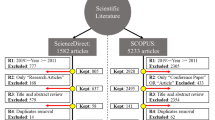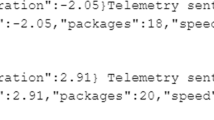Abstract
Motivated by scheduling challenges in back-end semiconductor manufacturing, we propose a framework to oversee and integrate local decentralized scheduling algorithms utilized in complex supply chain manufacturing networks. We fill the gap between higher-level production planning and lower-level scheduling by establishing short-term production targets and priority scores for each product at each step in the system. Given a target output schedule, target cycle times for each step, the process and product structure, and initial WIP status, short-term production targets for each product/step are set. These targets can be used to evaluate the system performance and guide decentralized schedulers to control the system so as to achieve desirable outputs in dynamic environments.
Similar content being viewed by others
References
Anthony, R.N. (1965). Planning and Control Systems: A Framework for Analysis. Harvard University Press, Cambridge, Massachusetts.
Bai, X. and S.B. Gershwin. (1996). “Scheduling Manufacturing Systems with Work-in-process Inventory Control: Reentrant Systems.” OR Spektrum, 18, 187–195.
Bai, X. and S.B. Gershwin. (1995). “Scheduling Manufacturing Systems with Work-in-process Inventory Control: Single-part-type Systems.” IIE Transactions, 27, 599–617.
Bai, X. and S.B. Gershwin. (1994). “Scheduling Manufacturing Systems with Work-in-process Inventory Control: Multiple-part-type Systems.” International Journal of Production Research, 32(2), 365–385.
Burman, D.Y., F.J. Gurrola-Gal, A. Nazari, and S. Sathaye. (1986). “Performance Analysis Techniques for IC Manufacturing Lines.” AT&T Technical Journal, 65 (4).
Conway, R., W. Maxwell, J.O. McClain, and L.J. Thomas. (1988). “The Role of Work-in-process Inventory in Serial Production Lines.” Operations Research, 36(2), 229–241.
Gascon, A., R.C. Leachman, and A.A. De Guia. (1993). “Optimal Planning and Control of Consumer Products Packaging Lines.” In Tito A. Ciriani and Robert C. Leachman (Eds.), Optimization in Industry, pp. 173–189, John Wiley & Sons, Ltd.: Sussex, England.
Glassey, C.R. and M.G.C. Resende. (1988). “Closed-Loop Job Release Control Rules for VLSI Circuit Manufacturing.” IEEE Transactions on Semiconductor Manufacturing, 1(1), 36–46.
Hall, N.G. and C.N. Potts. (2003). “Supply Chain Scheduling: Batching and Delivery.” Operations Research, 51(4), 566–584.
Hax, A.C. and J.J. Golovin. (1977). Hierarchical Production Planning Systems. Massachusetts Institute of Technology, Cambridge.
Hax, A.C. and H.C. Meal. (1973). Hierarchical Integration of Production Planning and Scheduling. Massachusetts Institute of Technology, Cambridge.
Jula, P. (2002). Scheduling Back-end Semiconductor Manufacturing. Ph.D. Dissertation, U.C. Berkeley.
Kang, J. (1996). A method for Target Scheduling of Semiconductor Wafer Fabrication Based on Event-Based Optimization Modeling and Discrete Event Simulation. Ph.D. Dissertation, U.C. Berkeley.
Kreipl, S. and M. Pinedo. (2004). “Planning and Scheduling in Supply Chains: An Overview of Issues in Practice.” Production and Operations Management, 13(1), 77–92.
Leachman, R.C., J. Kang, and V. Lin. (2002). “SLIM: Short Cycle Time and Low Inventory in Manufacturing at Samsung electronics.” Interfaces, 32 (1), 61–77.
Leachman, R.C. and V.S. Sohoni. (1991). “Automated Shift Scheduling as a Tool for Problem Identification and People Management in Semiconductor Factories.” In E. Eloranta (Ed.), Advances in Production Management systems, pp. 351–360. North Holland, Amsterdam.
Leachman, R.C., M. Solorzano, and C.R. Glassey. (1988). A Queue Management Policy for Release of Factory Work Orders. Research Report 88-19. Engineering Systems Research Center, U.C. Berkeley.
Ovacik, I.M. and R. Uzsoy. (1997). Decomposition Methods for Complex Factory Scheduling Problems. Kluwer Academic Publishers.
Srivarsan, N. and K. Kempf. (1995). “Effective Modeling of Factory Throughput Times.” In Proceedings of Seventeenth IEEE/CPMT International Electronics Manufacturing Technology Symposium ‘Manufacturing Technologies – Present and Future, Austin, TX, USA, 2–4 Oct. New York, NY, USA: IEEE, 377–83.
Van Zant, P. (2000). Microchip Fabrication: A Practical Guide to Semiconductor Processing, 4rd ed. McGraw-Hill: New York.
Vepsalainen, A.P.J. and T.E. Morton. (1988). “Improving Local Priority Rules with Global Lead-Time Estimates: a Simulation Study.” Journal of Manufacturing and Operations Management, 1(1), 102–118.
Wu, D. and M.G. Ierapetritou. (2003). “Decomposition Approaches for the Efficient Solution of Short-term Scheduling Problems.” Computers and Chemical Engineering, 27, 1261–1276.
Youxun S. (1997). Stochastic Wafer Fabrication Scheduling. Ph.D. Dissertation, U.C. Berkeley.
Author information
Authors and Affiliations
Corresponding author
Rights and permissions
About this article
Cite this article
Jula, P., Leachman, R.C. Coordinating decentralized local schedulers in complex supply chain manufacturing. Ann Oper Res 161, 123–147 (2008). https://doi.org/10.1007/s10479-006-0148-y
Published:
Issue Date:
DOI: https://doi.org/10.1007/s10479-006-0148-y




